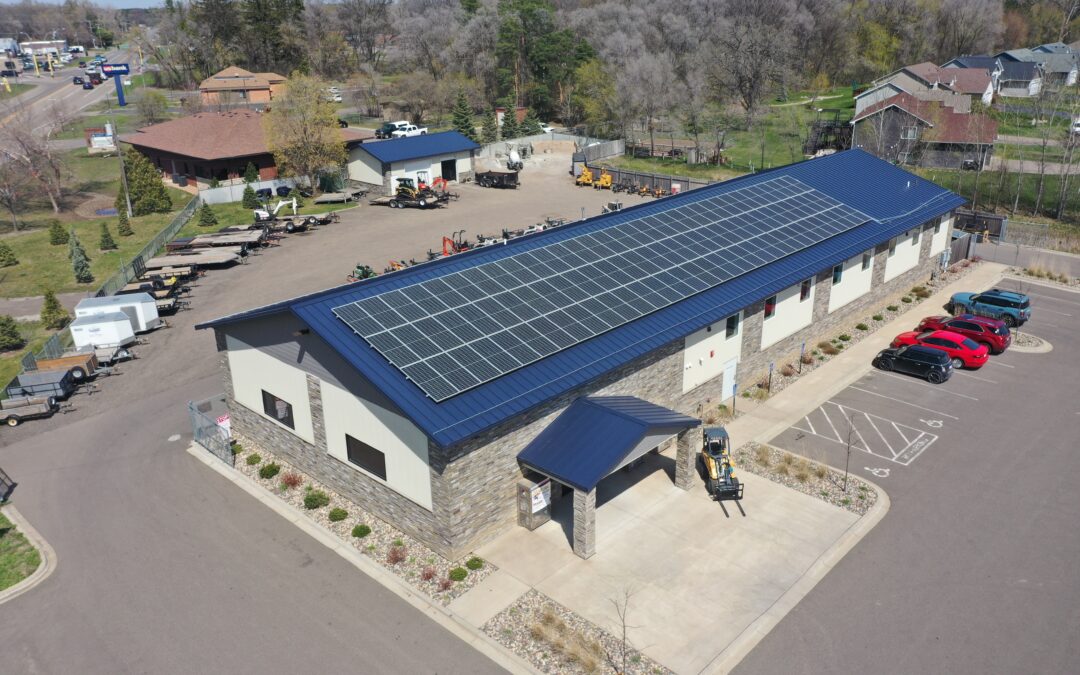An increasing number of small businesses have been turning to solar energy as a viable and sustainable solution to meet their energy needs. The rising cost of electricity, combined with the growing awareness of environmental issues, has prompted many small business owners to explore alternative energy sources. Solar panels for small businesses offer a range of benefits, from significant cost savings to enhanced sustainability. This blog will explore the reasons why small businesses are making the switch to solar energy, and how they can benefit from this renewable energy source.
Cost Savings with Solar Panels for Small Businesses
One of the most compelling reasons for small businesses to switch to solar energy is the potential for cost savings. Electricity bills can constitute a substantial portion of a business’s operating expenses. By installing solar panels, businesses can generate their own electricity, thereby reducing their reliance on the grid and lowering their monthly energy bills.
According to the Solar Energy Industries Association (SEIA), businesses that install commercial solar panel systems can save an average of 75% on their electricity bills over the lifetime of the system. These savings can be particularly impactful for small businesses, where margins are often tight, and every dollar saved can contribute to the bottom line.
Financial Incentives and Rebates
Small businesses in Minnesota can take advantage of various financial incentives and rebates that make solar energy more affordable. The federal Investment Tax Credit (ITC) allows businesses to deduct a significant portion of the cost of installing solar panels from their federal taxes. In addition to the federal ITC, Minnesota offers state-specific incentives, such as the Solar Energy Incentive Program (SEIP), which provides rebates to help offset the initial cost of solar panel installation.
Local utility companies in Minnesota also offer incentives for businesses that switch to solar energy. These programs can further reduce the cost of installation and improve the return on investment for small businesses.
Enhancing Sustainability and Corporate Social Responsibility
Switching to solar energy allows small businesses to demonstrate their commitment to sustainability and corporate social responsibility (CSR). By reducing their reliance on fossil fuels and lowering their carbon footprint, businesses can contribute to environmental conservation and promote a greener future. This commitment to sustainability can also enhance a company’s brand image, making it more attractive to environmentally-conscious consumers and stakeholders.
Incorporating solar energy into a business’s operations can also provide marketing advantages. Many consumers today prefer to support businesses that prioritize sustainability and environmental responsibility. By showcasing their use of solar energy, businesses can differentiate themselves from competitors and appeal to a broader customer base.
Energy Independence and Reliability
Solar energy provides small businesses with greater energy independence and reliability. By generating their own electricity, businesses are less vulnerable to fluctuations in energy prices and potential disruptions in the grid. This energy independence can be particularly beneficial for businesses that operate in areas prone to power outages or with unstable electricity supplies.
Furthermore, advancements in energy storage technology allow businesses to store excess solar energy generated during the day for use during periods of low sunlight or peak demand. This ensures a consistent and reliable power supply, even when the sun isn’t shining.
How to Switch to Solar Energy for Your Business
Making the switch to solar energy involves several key steps:
- Assessment and Consultation: The first step is to assess your business’s energy needs and determine the feasibility of installing solar panels. This involves a consultation with a reputable solar panel provider, who will evaluate your energy consumption, available space for solar panels, and potential savings.
- Design and Proposal: Based on the assessment, the solar panel provider will design a customized solar energy system tailored to your business’s specific needs. They will provide a detailed proposal outlining the project scope, costs, expected energy savings, and potential return on investment.
- Financing and Incentives: The provider will help you navigate the various financing options and incentives available to make the installation more affordable. This includes federal and state tax credits, rebates, and local utility incentives.
- Installation: Once the design and financing are finalized, the solar panel system will be installed by certified technicians. The installation process typically involves mounting the panels, connecting them to inverters, and integrating the system with your existing electrical infrastructure.
- Monitoring and Maintenance: After installation, the system will be activated and monitored to ensure optimal performance. Regular maintenance, such as cleaning the panels and inspecting the system for any issues, is essential to maintain efficiency and prolong the lifespan of the system.
Overcoming Challenges
While the benefits of solar energy are clear, small businesses may face challenges when making the switch. Initial installation costs can be a barrier, but the availability of financial incentives and flexible financing options can help mitigate these costs. Additionally, businesses may need to navigate regulatory requirements and obtain necessary permits for installation. Working with an experienced solar panel provider can help streamline this process and ensure compliance with all regulations.
Embrace the Shift to Solar
The shift to solar energy is becoming increasingly popular among small businesses, and for good reason. Solar panels offer significant cost savings, enhance sustainability, provide energy independence, and improve a company’s brand image. For small businesses in Minnesota, the availability of financial incentives and rebates makes the transition to solar energy even more attractive.
By following a structured approach and working with a reputable solar panel provider, small businesses can successfully switch to solar energy and enjoy the numerous benefits it offers. If you’re considering making the switch, now is the perfect time to explore how solar energy can transform your business and contribute to a more sustainable future. Contact Cedar Creek Energy today to learn more about our commercial solar panel systems and how we can help you make the switch to solar energy.

